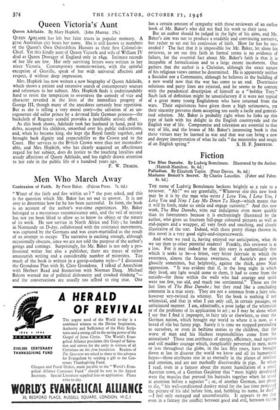Men Who March Away
Confession of Faith. By Peter Baker. (Falcon Press. 7s. 6d.)
" WHAT of the faith and fire within us r the poet asked, and this is the question which Mr. Baker has set -out to answer. It is not easy to determine how far he has been successful. In form, the book is an account of the author's war-time experiences. Mr. Baker belonged to a mysterious reconnaissance unit, and the veil of secrecy has not yet been lifted to allow us to know its object or the nature of its work. He saw service in North Africa and Italy ; he landed in Normandy on D-day, collaborated with the resistance movements, was captured by the Germans and was court-martialled as the result of an attempt to escape. The narrative is exciting enough, although occasionally obscure, since we are not told the purpose of the author's goings and comings. Surprisingly, for Mr. Baker is not only a pro- fessional writer but also a publisher, there are traces of rather amateurish writing and a considerable number of misprints. Too much of the book is written in a gossip-column style—" I discussed the Grondona Plan with St. Clare Grondona. I talked of Anarchism with Herbert Read and Steinerism with Norman Dag,g. Michael Balcon warned me of political dishonesty and crooked thinking "- and the conversations are usually too stilted to ring true. One
has a certain amount of sympathy with those reviewers of an earlier book of Mr. Baker's who did not find his work to their taste.
But an author should be judged in the light of his aims, and Mr. Baker's aim was not to produce a readable and convincing narrative, but rather to set out his confession of faith. How far has he suc- ceeded ? The fact that it is impossible for Mr. Baker, let alone his reviewer, to set out this faith in formal terms is no evidence of failure, for the essential fact about Mr. Baker's faith is that it is incapable of formalisation and to a large extent incoherent. One gathers that the author is a Christian, although the exact nature of his religious views cannot be determined. He is apparently neither a Socialist nor a Communist, although he believes in the building of a new world now that the war has come to an end. Doctrinaire solutions and party lines are rejected, and he seems to be content with the paradoxical description of himself as a " bolshie Tory." Such lack of definition might be unsatisfactory if it were not typical of a great many young Englishmen who have returned from the wars. Their experiences have given them a high seriousness, yet their sincerity prevents them accepting too easily a facile and general- ised solution. Mr. Baker is probably right when he links up this type of faith with his delight in the English countryside and the English way of life. Compromise and toleration are essential to that way of life, and the lesson of Mr. Baker's interesting book is that these virtues may be learned in war and that war can bring a new and deeper interpretation of what he calls "the minstrelsy and magic






























 Previous page
Previous page